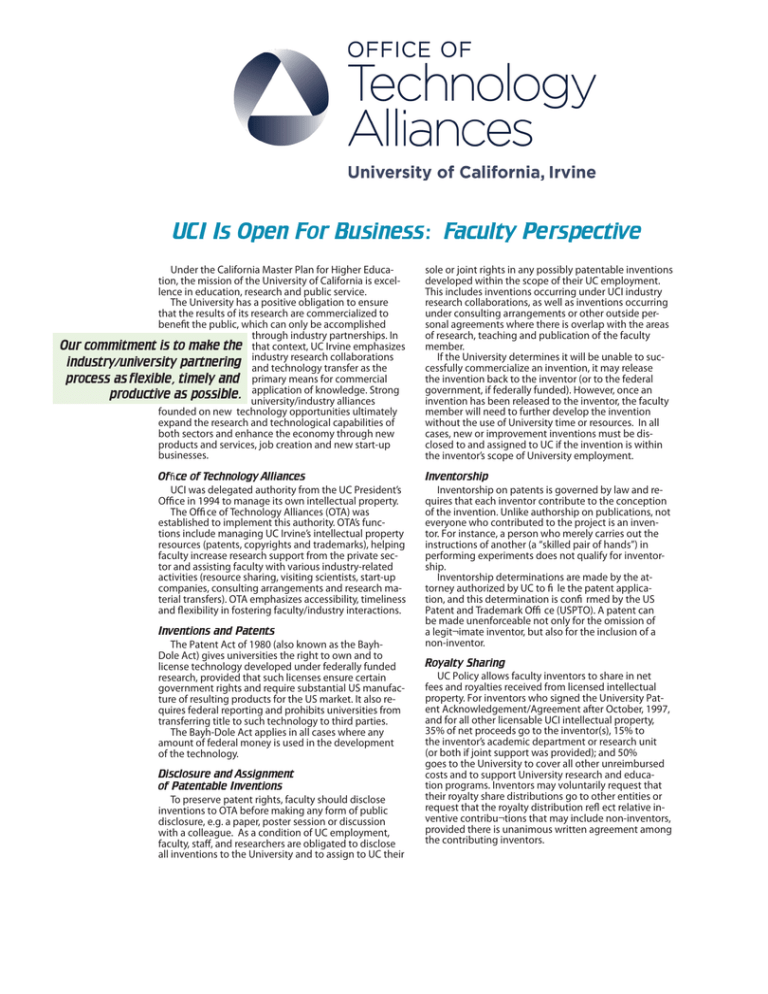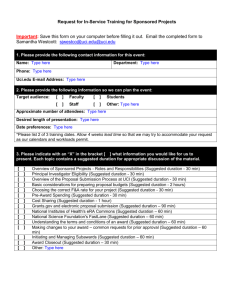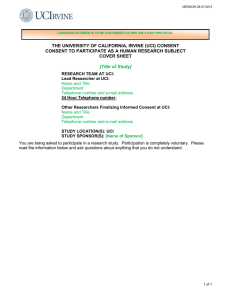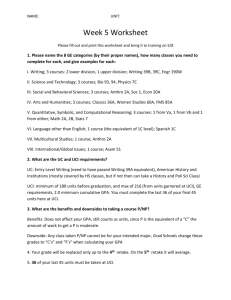
UCI Is Open For Business: Faculty Perspective
Under the California Master Plan for Higher Education, the mission of the University of California is excellence in education, research and public service.
The University has a positive obligation to ensure
that the results of its research are commercialized to
benefit the public, which can only be accomplished
through industry partnerships. In
Our commitment is to make the that context, UC Irvine emphasizes
research collaborations
industry/university partnering industry
and technology transfer as the
process as flexible, timely and primary means for commercial
application of knowledge. Strong
productive as possible. university/industry
alliances
founded on new technology opportunities ultimately
expand the research and technological capabilities of
both sectors and enhance the economy through new
products and services, job creation and new start-up
businesses.
sole or joint rights in any possibly patentable inventions
developed within the scope of their UC employment.
This includes inventions occurring under UCI industry
research collaborations, as well as inventions occurring
under consulting arrangements or other outside personal agreements where there is overlap with the areas
of research, teaching and publication of the faculty
member.
If the University determines it will be unable to successfully commercialize an invention, it may release
the invention back to the inventor (or to the federal
government, if federally funded). However, once an
invention has been released to the inventor, the faculty
member will need to further develop the invention
without the use of University time or resources. In all
cases, new or improvement inventions must be disclosed to and assigned to UC if the invention is within
the inventor’s scope of University employment.
Offi ce of Technology Alliances
Inventorship
UCI was delegated authority from the UC President’s
Offi ce in 1994 to manage its own intellectual property.
The Offi ce of Technology Alliances (OTA) was
established to implement this authority. OTA’s functions include managing UC Irvine’s intellectual property
resources (patents, copyrights and trademarks), helping
faculty increase research support from the private sector and assisting faculty with various industry-related
activities (resource sharing, visiting scientists, start-up
companies, consulting arrangements and research material transfers). OTA emphasizes accessibility, timeliness
and fl exibility in fostering faculty/industry interactions.
Inventorship on patents is governed by law and requires that each inventor contribute to the conception
of the invention. Unlike authorship on publications, not
everyone who contributed to the project is an inventor. For instance, a person who merely carries out the
instructions of another (a “skilled pair of hands”) in
performing experiments does not qualify for inventorship.
Inventorship determinations are made by the attorney authorized by UC to fi le the patent application, and this determination is confi rmed by the US
Patent and Trademark Offi ce (USPTO). A patent can
be made unenforceable not only for the omission of
a legit¬imate inventor, but also for the inclusion of a
non-inventor.
Inventions and Patents
The Patent Act of 1980 (also known as the BayhDole Act) gives universities the right to own and to
license technology developed under federally funded
research, provided that such licenses ensure certain
government rights and require substantial US manufacture of resulting products for the US market. It also requires federal reporting and prohibits universities from
transferring title to such technology to third parties.
The Bayh-Dole Act applies in all cases where any
amount of federal money is used in the development
of the technology.
Disclosure and Assignment
of Patentable Inventions
To preserve patent rights, faculty should disclose
inventions to OTA before making any form of public
disclosure, e.g. a paper, poster session or discussion
with a colleague. As a condition of UC employment,
faculty, staff, and researchers are obligated to disclose
all inventions to the University and to assign to UC their
Royalty Sharing
UC Policy allows faculty inventors to share in net
fees and royalties received from licensed intellectual
property. For inventors who signed the University Patent Acknowledgement/Agreement after October, 1997,
and for all other licensable UCI intellectual property,
35% of net proceeds go to the inventor(s), 15% to
the inventor’s academic department or research unit
(or both if joint support was provided); and 50%
goes to the University to cover all other unreimbursed
costs and to support University research and education programs. Inventors may voluntarily request that
their royalty share distributions go to other entities or
request that the royalty distribution refl ect relative inventive contribu¬tions that may include non-inventors,
provided there is unanimous written agreement among
the contributing inventors.
Record Keeping
Faculty should keep bound laboratory notebooks
up-to-date, signed and witnessed, particularly for
significant scientifi c discoveries. The witness should be
someone who can understand the material and who
is not an inventor. These notebooks may be essential
to obtaining a patent and proving inventorship. The
descriptions and dates (properly witnessed) are vital in
competitive situations and in legal disputes (see OTA’s
Web Directory included with this brochure).
The Dynamic Cooling Device selectively cools the
outermost layers of human skin during laser surgery
allowing higher light dosages, more effectivetreatment
with less pain, and less post operative scarring.
Inventors: J.S. Nelson, T. Milner & L. Svaasand
Beckman Laser Institute
to local economic development and job creation. OTA
will seriously consider inventor desires to start companies in its technology licensing decisions, provided that
the arrangements conform to UCI’s confl ict of interest
and confl ict of commitment policies. OTA will also work
proactively with those start-ups that are formed and
their investors to optimize the chances of a successful company launch and the attraction of successive
rounds of fi nancing.
Licensing UCI Technologies
UCI may issue exclusive or non-exclusive licenses,
and may limit licenses by fi eld or by geographic region,
depending on the circumstances and the industry sector.
Licenses are negotiated in good faith using appropriate industry standards for fees and royalties.
Companies may negotiate options to license agreements to secure the company’s commercial position in
return for an option fee and reimbursement of patent
costs, which is consideration for the value of the right
to commercialize publicly funded inventions. Licensees
have the following obligations:
• Reimburse UC for patent costs for licensed technology
• Ensure diligent commercialization of licensed
technology according to a sound business plan
• Pay a license issuance fee (may be spread out
in milestone payments); UCI may take equity
in small or start-up companies as part of this consideration
• Pay a royalty on net sales of licensed products,
with the rate being adjusted in cases of a jointly
owned invention or if multiple technologies contribute to a product
• Accept provisions covering indemnifi cation, insurance, no UC warranty, California law and limitations on the use of the University’s name
Variation by Industry Sector
UCI, in its licensing practice, can accommodate the
varying circumstances across industry sectors with a
range of licensing alternatives. At one end of the spectrum are low-cost, non-exclusive licenses to companies
that want to enter a market quickly and
All parties benefit where intellectual property protection is less
from expert legal critical. At the other end of the spectrum is
exclusive license for a platform technolscrutiny. an
ogy that was fully funded by public funds
where intellectual property rights are paramount. In the
latter case, substantial fees, royalties and diligent commercialization will be required of the licensee. OTA will
work with potential licensees to establish terms that are
fair and appropriate for the technology, the University
and the particular industry sector.
Start-Up Companies
UCI supports faculty entrepreneurship and the creation of start-up companies founded on the inventor’s
new technology. Such companies represent an important and viable path to product commercialization and
Antigen Discovery, Inc. is developing a protein microarray
based serodiagnostic platform for applications in biodefense
and emerging infectious diseases.
Inventors: Abraham P. Lee, Armando Tovar, Uland Liao from
The Henry Samueli School of Engineering and Philip Felgner,
David Davies, Xiaowu Liang from the School of Biological
Sciences.
A Winning Strategy for Industry Partnering
OTA has developed a successful strategy for industry
partnerships. This strategy focuses on building long-
•
Clinical Trials involve testing of sponsor-owned
drugs or devices using the sponsor’s protocol,
with rights to results and often technology improvements accruing to the sponsor.
• Gifts are irrevocable donations to general or
specific areas of campus activity that carry no
obligations for deliverables or rights to results,
although UCI may provide a courtesy report to
the sponsor indicating what was accomplished
with the funds.
Companies can fi nd additional information on types
of awards and model agreements on the OTA web site
(www.ota.uci.edu). Additional information for faculty is
on the RGS website (www.research.uci.edu).
Publications
term corporate alliances founded on new technologies with the goal of helping the company, the faculty
inventor and the University achieve their multiple
objectives.
UCI’s Office of Technology
The corporate partner
Alliances has a proven is given the opportunity to
acquire commercial rights to
winning strategy. an embryonic technology and
an incentive to support continued research to further
develop the invention in the inventor’s laboratory.
Industry-Sponsored Research
Industry-sponsored projects can be supported either
by an individual company or by a consortium using the
following award mechanisms:
• Research Contracts define a scope of work carried out solely by UCI (possibly with subcontractors) and may provide sponsor access to resulting
inventions and research results made within the
project scope and term. Collaborative Research
Contracts involving company and UCI scientists
include mutual obligations, and sharing of data,
facilities and materials. Contracts can result in
joint UC/company ownership of patents jointly
invented.
Ampakine molecule that facilitates glutamate receptors and
thereby improves communication between neurons in the cerebral
cortex. Clinical development is currently underway for a wide range
of brain disorders including memory loss in the elderly, Alzheimer’s
Disease, schizophrenia, and Attention Deficit Disorder.
Inventors: G. Lynch et al. College of Medicine
Faculty must be free to publish the results of
research emanating from industry collaborations.
However, an industry sponsor can expect the right of
prior review (30 to 60 days) and to request removal of
proprietary company information inadvertently included
in the publication. The sponsor may also request that
UCI fi le a patent (at the sponsor’s expense) within an
additional 30 to 60 days (total period of delay must not
exceed 90 days).
Faculty should contact OTA prior to publishing or
disclosing any potentially patentable material to ensure
patents are fi led before public disclosure. Failing to do
so will result in immediate loss of foreign rights and
U.S. rights will be lost if a patent is not fi led within one
year of disclosure. Further, failing to do so may prevent
UC from being able to meet its reporting obligation to
the federal government or its licensing obligation under
a funding agreement.
Confidentiality
As a public educational institution operating in an
open academic environment, UCI needs to minimize
the amount of confi dential material it receives. However, UCI can agree to keep sponsor’s defi ned material
confidential for a limited time to the same extent that
UCI protects its own confi dential information. When
unpatented UCI proprietary information is shared with
a company, the company should be asked to sign
a Non-Disclosure Agreement (NDA), which may be
obtained through OTA. This will ensure patent rights
are preserved and that the faculty member’s proprietary
information is protected and secured. UCI does not
accept materials covered under export control rules
without pre-notifi cation and only where such materials are required in order to complete the
scope of work.
Industry Use of University Resources
Accessing Facilities, Equipment and Instrumentation
Exchanging Tangible Research Materials
When a campus unit wishes to render a non-research
service or provide goods to a user outside the University for which revenue is collected and for which there
is no easily available commercial source, a Sales and
Service Agreement is required. This type of agreement
is appropriate when the furnishing department incurs
expense to make available a product or service that is
sold to the non-University user for an established price,
or at a price based on an established
UCI is a broad and standard pricing method. A nonrespected resource University user is either an organizaor individual who uses campus
for industry. tion
services or facilities or purchases
goods from a campus unit and who is not a member
of the campus community (faculty, staff, students).
Sales and Service Agreements should not be used to
carry out research relationships. For more information
on Sales and Service Agreements, please refer to OTA’s
Web Directory included with this brochure.
Visiting Scientists
Anyone using UC research facilities or anyone paid
by UC-administered funds (internal or external source)
must sign the UC Patent Acknowledgement and agree
to disclose and assign to UC any inventions made with
UC resources. Contact OTA if there are questions or
exceptional circumstances.
UCI may share its tangible research products (TRPs)
with other non-profi t or for-profi t entitities, just as
third parties may share their own TRPs with UCI, under
material transfer agreements (MTAs). MTAs provide for
appropriate research, evaluation and testing, and usually impose restrictions on further distribution. Normally
each party has the right to use its research results
generated from work performed with the materials,
and companies may use the results commercially via a
license or other exchange agreement.
The purpose of an MTA is to help investigators
acquire materials to advance research. However, there
is a risk that improper language in an incoming MTA
can severely restrict an investigator’s future research opportunities and can impose contractual terms that UCI
cannot accommodate. The most frequent problematic
terms in incoming MTAs: (a) limit academic freedom,
(b) assert excessive rights, sometimes even ownership
of University research results, (c) ask for inappropriate
indemnification, and (d) impose obligations that conflict with those in other funding agreements or federal
grants.
For further discussion of appropriate terms in MTAs
see the COGR Q&A brochure or NIH Policy on Sharing Research Resources and for further information on
MTAs refer to OTA’s Web Directory included with this
brochure.
Intellectual Property Defined
Patents
Patents grant up to a 20 year right from the date
of fi ling in the U.S. to exclude others from making,
using or selling claimed products or services.
In order to obtain a patent on an invention, the
invention must be “conceived and reduced to practice”, meet the US Patent & Trademark Offi ce standards of novelty and usefulness and not be obvious
to someone skilled in the area of the invention.
Patents in other countries must be fi led separately
within one year of the U.S. patent application fi ling
date. A “Provisional Patent Application” can be fi led
quickly and inexpensively in order to preserve some
patent rights for up to one year on an initial discovery, allowing for publication and further research to
be undertaken.
Copyrights
Protect the form of expression of works set forth in a
tangible medium. Protection is automatically granted
to authors for their lifetime plus 70 years or 95 years
from fi rst publication for a work made for hire.
Copyrighted works may be owned by authors or the
University, depending on the circumstances of the
work s development.
Trademarks
Protect images, designs, logos, names, sounds and
other means of uniquely identifying a product or
service. Trademarks derived from UCI programs can
be protected by OTA. A Trademark is perpetual but
requires the continued use and enforcement of the
mark on the part of the owner.
Know-How
UC does not assert rights to faculty skills or knowledge, absent faculty consent in limited cases. Faculty
members are free to share this know-how with companies under personal consulting agreements, to the
extent that the resulting obligations do not interfere
with UCI research and teaching responsibilities.
Negotiation, Review and Approval of Agreements
Agreements with UCI go through the following
review and approval process:
• Sponsored and collaborative research agreements
are signed by the UCI Offi ce of Sponsored Projects Administration
• Technology options, licenses, non-disclosure, and
material transfer agreements are negotiated and
signed by the UCI Offi ce of Technology Alliances
(OTA)
• Exceptions to University policy must be approved
by the UC Offi ce of the President
• All agreements are subject to legal review and,
as needed, clearance by Animal and Human
Subjects Committees (as well as the Confl ict of
Interest Oversight Committee for projects where
the faculty member has a fi nancial interest in the
sponsor)
• For complex industry partnerships, OTA often
serves as a focal point for UCI negotiations, coordination and communication with the industry
partner
• Important principles that apply to any university
agreement include: open dissemination, accessibility of results for University purposes, public
benefit, informed participation, legal integrity,
protecting student involvement, fair economic
value for public assets, and objective decisionmaking. See the President’s Policy: Principles
Regarding Rights to Future Research Results in
University Agreements with External Parties in
OTA’s web directory.
UC Policies Governing Personal Faculty/
Industry Relationships
UCI encourages faculty relationships with industry
through sponsored research and consulting. Such relationships must comply with UC policies
UCI encourages on Confl ict of Interest, Faculty Consultfaculty relationships ing and Leaves of Absence. Both UCI
faculty and industry representatives
with industry. need to be aware of these policies. The
following sections provide more specifi cs.
Confl icts of Interest and Commitment
Confl icts of interest and commitment arise when a
faculty member’s public research and teaching activities converge with his or her private fi nancial interests
(e.g. income, consulting, stock ownership, management or board positions) in the same or related subject
areas. Provided that the faculty member fulfi lls all his
or her University teaching and research obligations, the
following conditions apply to the various types of UCI/
company relationships in which the faculty member
is required to disclose his/her fi nancial interest in a
company:
• Company provides sponsored research or
gift funding: Disclosure required and review/
approval by the Vice Chancellor for Research on
the recommendation of the Confl ict of Interest
Oversight Committee (COIOC) is required prior
to acceptance of an award. This includes awards
from the federal government in the same subject
area. In some cases, potentially harmful confl icts
can be managed through an ad hoc reporting or
oversight committee review process.
• Company licenses UCI technology:
Disclosure
is required if the faculty inventor has a fi nancial
interest in the potential licensee. Inventors should
normally not be involved in licensing negotiations. Further, any inventor with such a fi nancial
interest should disqualify himself/herself from
involvement in any licensing decisions or such
decisions would need to be subjected to an intervening substantive review process.
• Company product involved in Human Subjects Research: Disclosure is required through
the Human Subjects IRB process, and positive disclosures are referred to the COIOC. The COIOC
reviews the case and recommends appropriate
actions, and actual descriptive language that will
appear in the Human Subjects consent form.
For further discussion of confl icts of interest and
commitment, see www.research.uci.edu/ora/coi/. For
disclosure and approval processes for all forms of Compensated Outside Professional Activities, please refer to
the Academic Senate Policy APM-025.
Faculty Consulting
UCI encourages faculty to engage in consultingoutside activities that contribute to their profession and
fulfill UCI’s public service mission. to the extent that
Theses activities, such as consulting, does should
not interfere with teaching and research obligations
or use University resources. Consulting agreements
are personal agree ments to which UCI is not a party.
Faculty members should ensure that these agreements
are consistent with their preexisting UC intellectual
property obligations, which include the obligation to
disclose all inventions and may include the obligation
to assign inventions to the University (see www.ota.uci.
edu/fac_consulting.htmthe “Guide to Consulting for
UCI Academic Employees” on OTA’s web directory).
High aspect ratio carbon posts used for three-dimensional
C-MEMS Microbattery.
Inventor: Mard Madou, The Henry Samueli School of
Engineering
Leaves of Absence
Intellectual property issues may arise when a faculty
member desires a Leave of Absence (LOA). Usually
leave is without salary to work with or for an outside
entity for a defined period of time, and UCI employment status is retained.
OTA can work with the School and the outside
entity to frame a Letter Agreement clarifying intellectual property rights that arise during the LOA. OTA will
then confirm the implications of the outside arrangements with the faculty member in a Special Investigator
Agreement that will also clarify UCI’s expectations for
appropriate teaching and research involvement of the
faculty member while on leave.
UCI Technology Transfer Process
Process
Begins
Invention
Research
Record of
Invention
UC Irvine
Technology
Alliances
Technical
Assessment
Patentability
Assessment
Marketability
Assessment
Inactivate
or Release
to Inventor
Research
Collaboration
Inventor(s)
( ) 35%
Inventor(s)
Department 15%
UC IIrvine
i 50%
0%
Net Fees
And
Royalties
Patent Cost
Reimbursements
License/
Option To
Company
Patent
Filing
Diligent
Commercialization
Public Bene t Through
New Products and Services
For More Information Contact:
Office of Technology Alliances • University of California, Irvine • 5141 California Avenue, Suite 200 • Irvine, CA 92697-7700
(949) 824-7295 • Fax: (949) 824-2899 • www.ota.uci.edu • ota@uci.edu
This brochure is a brief summary and is not intended to be a University policy statement.
Reference should be made to relevant University policies, which can change, before relying on the information in this brochure.
Copyright © 2012 The Regents of the University of California (Regents). All Rights Reserved.




